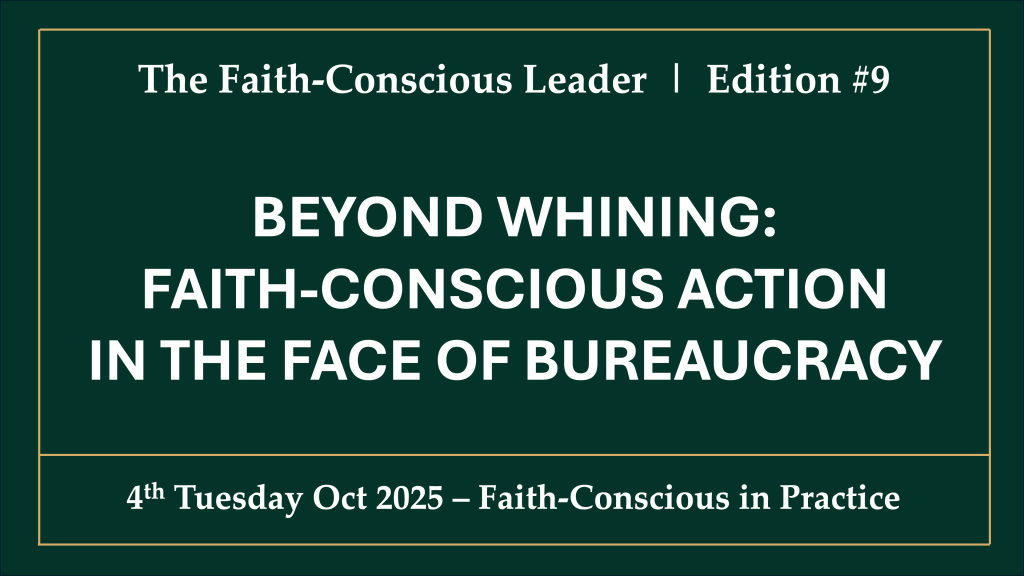Beyond Whining: Faith-Conscious Action in the Face of Bureaucracy

– How redha, sabr and ikhtiar transform frustration into purposeful initiative
THE “BANE” OF WORK PROCESSES
Almost every professional faces it: the bane of bureaucracy.
Procedures pile up, approvals drag and paperwork feels endless.
In a conversation (8½-minute video below) in 2023, I spoke with Dr. Nadiah Suki, an academic whose work life sometimes revolves around forms, reviews, ISO checklists and audits. Yet, instead of loudly complaining, she has learned to view these frustrations through a faith-conscious lens.
I encourage readers to watch patiently! It’s longer than my usual clips, but worth it. What unfolds is a journey from irritation to insight and finally to initiative.
SEEING THE BANE, BUT SEEKING MEANING
Dr. Nadiah reflected on how “processes are the bane of our existence,” yet she chooses not to rebel. Her turning point came when she linked those processes to serving students:
“It fulfills someone’s need also… the students, the teammates. We move forward together.”
That shift in lens transforms process from pointless to purposeful.
It echoes the Qur’anic reminder that even seemingly mundane acts can be acts of worship when done with sincerity:
“Say: ‘Indeed, my prayer, my sacrifice, my living and my dying are for Allah, Lord of the worlds.’” — Qur’an 6:162
FAITH LENS: FROM REDHA TO IKHTIAR
When frustration meets faith, four key principles come alive:
a. Redha (acceptance) – accepting reality without resentment.
As I suggested to her during our conversation, redha isn’t passive; it’s an active decision to stop fighting what is decreed. It creates inner peace, freeing energy to think constructively.
b. Sabr (patience and forbearance) – persisting with calm despite difficulty.
Dr. Nadiah acknowledged that processes can be painful but still necessary. Her perseverance, quiet and steady, mirrors the patience of a believer who trusts there is wisdom behind every challenge.
c. Shukr (gratitude) – appreciation that reframes the heart.
When we restrain from complaint, we’re already halfway to gratitude.
As mentioned in the discussion:
“If you are devoid (of) or very minimal in whining, actually you are passively practicing gratitude.”
d. Ikhtiar (effort and initiative) – striving for improvement without arrogance.
True redha doesn’t mean resignation; it leads to responsible action.
She said:
“If there’s an opportunity to change it, we will try to change it, maybe a review of the processes.”
THE TURNING POINT – CONNECTING TO PURPOSE
When Dr. Nadiah connected her daily administrative pain points to her higher purpose of service, everything shifted. No longer was she pushing paper; she was helping students progress, ensuring fairness and maintaining academic integrity.
This mirrors the Prophetic teaching:
“The best of people are those who are most beneficial to others.”
Even within rigid systems, aligning intentions (niyyah/niat/nawaitu) to benefit others transforms frustration into fulfillment.
PRACTICAL APPLICATION: TAKING ACTION BEYOND WHINING
How do we move from quiet acceptance to meaningful change? Here are practical steps distilled from our conversation:
1. Reframe the Purpose
Every form, meeting or report serves someone’s need: student, colleague, customer or beneficiary.
Start each task by asking, “Who benefits from this?”
2. Differentiate Complaint versus Contribution
Before voicing dissatisfaction, ask, “Have I offered a solution?”
Suggesting improvements or initiating a review mechanism turns critique into ikhtiar.
3. Create a “Process-of-the-Process” Review
If no system exists to improve procedures, propose one.
As we discussed, even establishing a simple “process review” channel fulfills amanah (trust) to continuously improve.
4. Practice Silent Gratitude
Instead of venting, whisper Alhamdulillah (Praise be to Allah).
Gratitude is not denial of hardship. It’s acknowledgement of hidden blessings: employment, stability and opportunity to serve.
5. Balance Redha and Initiative
Acceptance without effort breeds stagnation; effort without acceptance breeds stress.
Faith-conscious professionalism lives in the balance.
6. BONUS TIP (not framed like this in the video conversation): Make it “Sacred”
“Same old, same old” routine and monotony?
What if we treat the monotony as “sacred monotony”?
Sacred monotony is indeed the concept to remember. Then it can become skillful monotony and fulfilling monotony, like what’s said in the video conversation: ✔️ check it against a higher purpose.
If not the highest purpose each time, then the cascaded lower sub-purpose(s).
Sacred monotony is indeed when we enter any task with intention (niyyah/niat/nawaitu), versus mindless, automatic drifting.
Archers, violinists, Ironman athletes (I’m cheering my son-in-law at the Ironman Malaysia in Langkawi next month) or other achievers who repeat and practise hours on end for months or years on end do not complain of boring routine!
We perform religious rituals with sacred monotony (except if we approach them in automatic mode).
Try this:
- remembrance of deep intention
- mindfulness (being fully present every moment in every task) for all daily activities
be they for religious rituals or mundane work and life routines.
An alternative is: escape from boredom
- through falling for distractions
- bingeing on entertainment
You choose!
REFLECTION NOTE: THE LEADER’S QUIET REVOLUTION
Every organization has its frustrating procedures. What distinguishes faith-conscious leaders is not their immunity to annoyance, but their response.
They convert frustration into reflection, reflection into patience, patience into gratitude and gratitude into action.
As leaders, our character is tested in the big decisions, but what’s also daily tested are the small repetitive, boring ones — a test in how we handle the banes that don’t go away.
“And be patient, for indeed Allah does not allow to be lost the reward of those who do good.” — Qur’an 11:115
